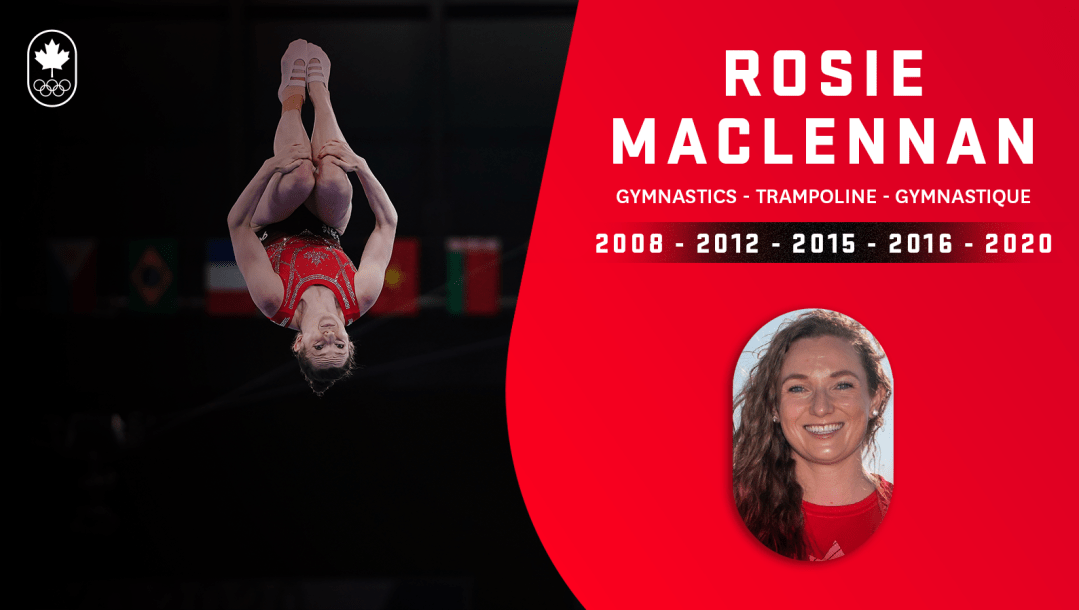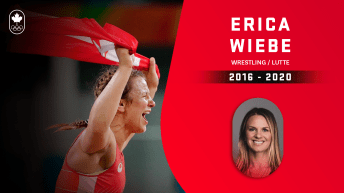Team Behind the Team: Meet Rosie MacLennan, two-time Olympic Gold Medallist in trampoline & Chair of the COC Athletes’ Commission
The Canadian Olympic Committee (COC) is proud to put athletes at the heart of everything it does. At all levels of our organization, from our Board of Directors to our interns, our team is comprised of people who truly believe in the power of sport – including an impressive group of Olympians, Paralympians, Pan American Games athletes, former national team athletes, rec league athletes, and passionate sport lovers. In this series, we’ll share stories from members of our team who have competed at major multi-sport Games and who are now dedicating their professional lives to helping the next generation of Team Canada athletes live their dreams.
Rosie MacLennan is a four-time Olympian who made her debut at Beijing 2008. MacLennan captured Canada’s first-ever Olympic gold medal in trampoline at London 2012 where she performed the most difficult routine of the competition. She made history again four years later at Rio 2016, becoming the first trampolinist to ever win back-to-back Olympic gold medals and the first Canadian athlete to successfully defend a title at the Olympic Summer Games. At Tokyo 2020, MacLennan missed the podium by one spot – an outstanding achievement given she’d been on crutches and wearing a walking boot just six weeks prior, after suffering a severe ankle sprain and two torn tendons during training. MacLennan retired in 2022 and has sat on the COC Athlete Commission since 2018.
This interview has been edited for length and clarity.
What has sport meant for you?
Sports gave me a playground to challenge myself and continuously improve. In many ways, sport is a microcosm of life as a whole. It gives you invaluable experiences in personal development in a way that for me was really exciting, energizing, and engaging.
Sport has also allowed me to expand what I believed to be possible but with a realistic expectation of what it would take to push those boundaries to reach new levels. Some of my greatest Olympic successes came after my most profound challenges, often involving injury. It gave me the perspective that challenges can be valuable in life and create opportunities.
What is the best part of being Chair of the COC’s Athletes’ Commission?
One of the biggest privileges of this role is the opportunity to work with 10 other athletes (six summer, four winter) who deeply care about the sport system. I am not just talking about their own sport experience – they care about the sport experiences of athletes across Canada. I’m proud of the team that’s in place and how much they dedicate to deeply thinking about some of the extremely complex issues in sport so that we consider multiple perspectives when coming up with proposals or solutions.
What’s the Athletes’ Commission’s relationship to the COC?
We are elected to advocate and represent the voice of Olympic athletes around Canada. We are there as a sounding board for the COC in their decision-making. It’s a way for them to have a conduit and an access point to speak directly with athletes or athlete representatives. We are supported by the COC but operate independently in the sense that we don’t have to necessarily agree with their positions. We can certainly challenge them on some of the decisions that they make, and we try to inform their decisions the best we can based on the insights that we gain from the athlete community more broadly.
Why did you get involved with the Athletes’ Commission?
I put my name up for election after Rio 2016 and was re-elected in 2021. It made me feel more comfortable to stay involved as an active athlete longer because I was developing skills for what might come next after I retire. It also provided a really great opportunity in an area I was passionate about and allowed me to pursue one of my core values, which is to have a positive impact on others where I can.
I know in many ways my sport experience was unique. I felt I had the support I needed. But I know that isn’t necessarily the case for all athletes across Canada. So, we are trying to create ways to systemically support more athletes.
The Athletes’ Commission is therefore focused on ensuring a stronger pipeline of athletes, keeping them in the sports system longer so they can reach their potential, and advocating so that being an athlete is viewed as a valuable first career.
We’re also listening to athletes to be their voice on the issues that matter most to them
There’s obviously been a lot that’s happened in the sports world that has influenced our goals based on conversations we’ve had with athletes.
What has been the Athletes’ Commission’s role in the recent conversation around safe sport?
Safe sport and creating a system that is focused on a humanistic development approach has been critical for us. The Commission has five different focus areas and one of them is around the sports system and culture.
It is about looking at the systems and structures in place and how we change them to create a better environment. That could involve everything from coach education to ensuring athletes have an avenue through which they can report issues, to educating athletes about what is acceptable behavior and what is not, or ensuring athletes have access to mental health resources and other tools they require. We have been pushing to redefine success and to move away from solely counting medals. It’s a balance between understanding we want excellence in the system and ensuring that the means to get to those outcomes are not creating an environment of risk.
In that space specifically, we were working directly with the COC and the Sports Minister’s office. In the fall, we provided them with specific priorities that we felt were necessary to ensure a safer environment for athletes. That included changes in governance structures for National Sport Organizations, more athlete representation, stronger mechanisms for reporting, and better accountability.
What has been the biggest surprise for you in the work you have been doing with the Athletes’ Commission?
I was an athlete rep for Gymnastics Canada before joining the Commission and I would say when I started, I didn’t know 90 percent of what I know now.
Athletes need to be given the resources and the opportunity to learn how to become effective members of a Board of Directors. There are some that can hit the ground running and have meaningful contributions from day one. But others need to be encouraged and supported. It is a board position and athletes in that role should be treated as any other director on the board. And so, viewing them as equals and meaningful participants in that environment. They should be equipped with any information given to a new board member.
There are also many resources available. AthletesCAN has plenty of useful documents. The COC does as well through the Queen’s University Smith School of Business and athlete representatives can access them. There is an entire network of athlete representatives and Commission members that you can lean on and rely on for support, advice, or guidance. My message to them is that you’re not alone.
What would you say to athletes interested in getting more involved in the sport system?
It has been so rewarding to be able to have an impact on athletes across the system.
I really hope that more athletes consider becoming athlete representatives. I don’t know if it’s a call to action, but strong encouragement for athletes to put their name forward to explore what it might look like and mean for them.
It’s an opportunity to become a better athlete. But it’s also an incredible opportunity to get more skills that you can add to your resume for whatever comes next.





